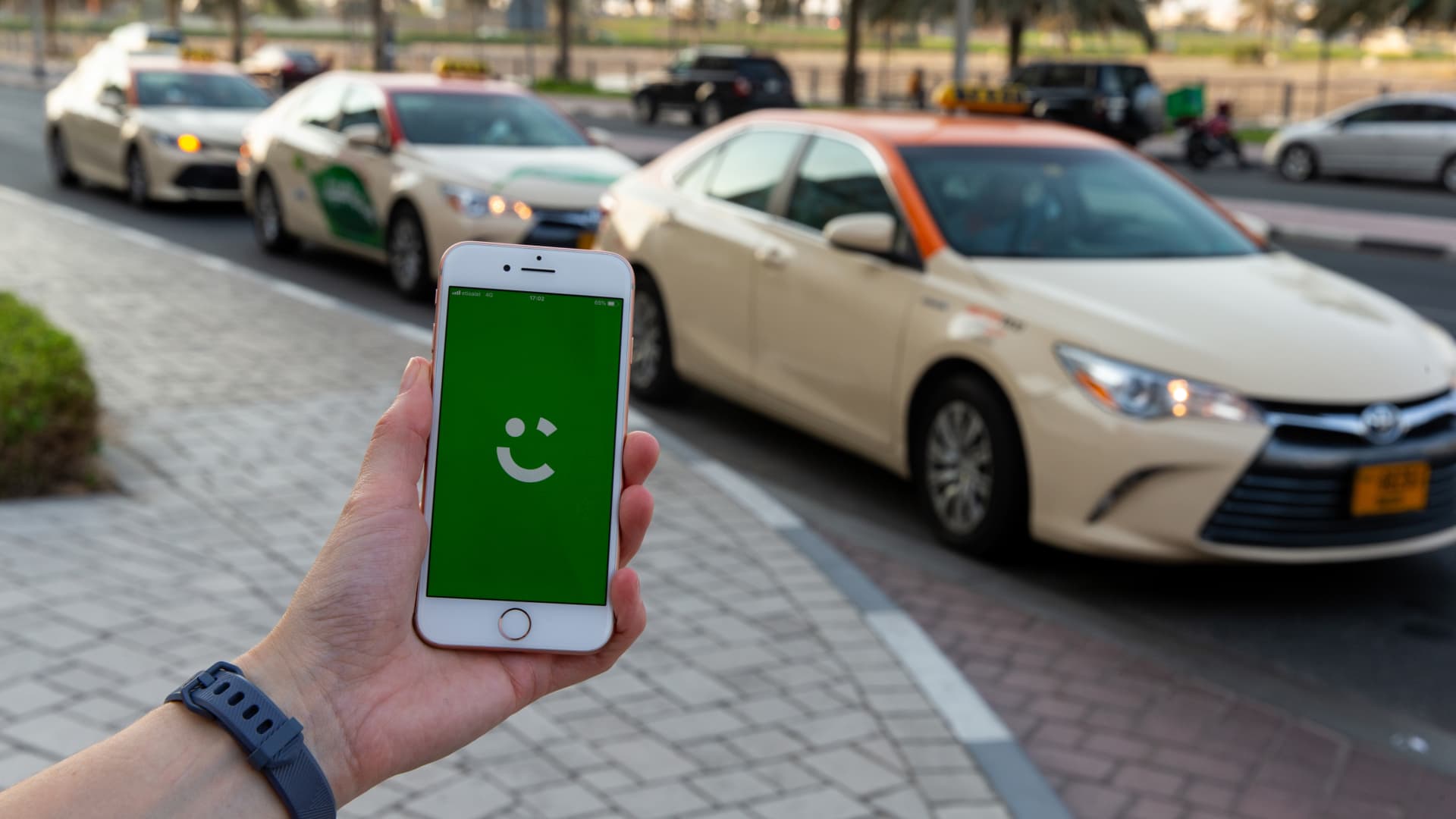DUBAI, United Arab Emirates — The Dubai-based rideshare app Careem is offering inter-country taxi journeys for the 2022 World Cup in Qatar, as millions of soccer fans from around the world descend on the tiny Gulf country for the Middle East’s first-ever go at hosting the massive tournament.
The offer doesn’t span all of the countries around Qatar but will be accessible to those traveling from two parts of neighboring Saudi Arabia: the city of Dammam, which is 250 miles (402 kilometers) away from the capital Doha and takes roughly 4.5 hours to get there, and Al Ahsa City, roughly 160 miles away from Doha with a journey time of 3 hours.
The fare? A fixed $266 each way (1000 Saudi riyals), or $532 for the round-trip, with a maximum of three passengers per taxi.
But will people opt for a multi-hour road trip rather than just taking a quick flight? Bassel Al Nahlaoui, Careem’s managing director for mobility, thinks so.
“This trip is really convenient. It’s around 3.5 hours and if you compare that to a flight, it matches the time it takes you to go to the airport and take the flight, land there, etc — except you’re in a car, you’re paying a fraction of the price, and if you split that with a couple of friends it becomes even cheaper,” Al Nahlaoui told CNBC.
Potential challenges
Still, travelers can only book the ride to Doha one day in advance, which could make planning ahead difficult.
And crossing the Saudi-Qatar border requires taking a shuttle bus, going through border control and meeting a new driver on the other side. But Careem says this part of the journey has also been fully accounted for.
“What happens is you open your app, you book a car from one of these two cities, a captain [driver] picks you up and drives you to the border,” Al Nahlaoui said. “At the border, we have Careem staff that will help you cross the border, find the captain that’s waiting for you on the Qatari side, and then that’s the last leg of the trip.”
“And our customer care is monitoring the trip throughout the journey itself,” he added, noting that Careem’s customer support staff numbers have been boosted.
To this end, contingencies have also been put in place if riders or drivers face problems or unruly behavior, Al Nahlaoui said.
“Our care team supports all verticals … we are able to increase and decrease our support volume nearly by day, that’s how flexible we are and how quickly we are able to adjust to support incoming calls,” he said. “In terms of crisis, we have a specific support line you can access through the app itself.”
In case the drivers themselves face trouble from passengers, “our captains have the same access to care that our customers have,” Al Nahlaoui said. “We have multiple channels for them to get immediate access or different types of support depending on the situation, so that has always been in place for captain support.”
World Cup boosting region’s demand
The rideshare app, which has grown into a “super-app” over the last few years to offer numerous services in addition to rides and was acquired by Uber in 2019, expects customer demand to balloon during the World Cup, which runs from Nov. 20 to Dec. 18.
But during large events in the region’s cities like international conferences or the Dubai Expo 2020, Careem cars were often difficult to find, and wait times multiplied, leaving many customers frustrated.
Al Nahlaoui says he hopes this won’t be the case this time, and that the company has amply prepared for the massive influx of people.
Careem, which operates in 80 cities, has “steadily expanded its fleet size by 1,000 additional cars over several months,” to prepare for the World Cup, the company said in a statement earlier this month.
The company expects the total number of Careem vehicles in Qatar — which span taxis, vans, luxury cars and motorbikes — to grow by more than 50% in time for the tournament.
Careem’s fleets in nearby cities like Dubai, the commercial capital of the United Arab Emirates, have been growing in tandem, Al Nahlaoui said.
The region’s top city for leisure tourism is expected to see a massive surge in visitors alongside Doha, as many opt to stay in Dubai but fly to Qatar for individual matches.
This is due at least in part to the struggle that Qatar, with a population of about 3 million, has faced in building up hotel capacity for its 1.2 million anticipated visitors during the tournament period. Qatar Airways is even offering “match day shuttles” that will allow spectators to fly into and out of the country within 24 hours for individual games.
To that end, Careem says it will have dedicated pickup lanes at Qatar’s Doha International Airport and Hamad International Airport providing direct rides to all eight World Cup stadiums.
And to prepare for the large volume of tourists coming into Qatar and the wider region from elsewhere in Asia, Careem has partnered with other countries’ popular rideshare and payments apps — Grab, Alipay, and Kakao — based in Singapore, China and South Korea, respectively — for direct app integration so that users can book Careem taxis on the apps they already use. Grab is the most-used rideshare app in Southeast Asia.
